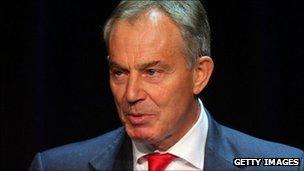Riots: Tony Blair warning over 'disaffected youth'
- Published
- comments

Tony Blair said the country as a whole was not in a 'moral decline'
The "big" cause of the riots in England was "alienated, disaffected youth... outside the social mainstream," former Prime Minister Tony Blair has said.
Writing in the Observer, he warned that "muddle-headed analysis", external of the riots may result in wrong policy responses.
Mr Blair also dismissed claims the UK was in the grip of a "moral decline".
In the Sunday Express, PM David Cameron pledged a fightback, external against the "bureaucratic nonsense and destructive culture" which led to current problems.
'No moral decline'
In rare comments on British politics since standing down as prime minister in 2007, Mr Blair said the riots were "an absolutely specific problem that requires a deeply specific solution" by politicians.
He pointed to a group of people "outside the social mainstream and who live in a culture at odds with any canons of proper behaviour".
"Focus on the specific problem and we can begin on a proper solution," he wrote.
"Elevate this into a highfalutin wail about a Britain that has lost its way morally and we will depress ourselves unnecessarily, trash our own reputation abroad, and worst of all, miss the chance to deal with the problem in the only way that will work."
He added that politicians' responses to the four days of rioting and looting created a danger of the "wrong analysis leading to the wrong diagnosis, leading to the wrong prescription".
He went on to say: "The key is to understand that they aren't symptomatic of society at large. Failure to get this leads to a completely muddle-headed analysis of what has gone wrong. Britain as a whole is not in the grip of some general 'moral decline'.
"The truth is that many of these people are from families that are profoundly dysfunctional, operating on completely different terms from the rest of society, either middle class or poor.
"This is a phenomenon of the late 20th Century. You find it in virtually every developed nation."
Bulger case
He also said that, following the murder of two-year-old Jamie Bulger in 1993, he had "made a case in very similar terms to the one being heard today about moral breakdown in Britain.
"I now believe that speech was good politics but bad policy."
Mr Blair said that, in relation to the rioting and looting, it was essential that the police felt they had the backing of the government.
"The police need to know they have strong support. They need to feel it from politicians and public alike."
He also said that towards the end of his term in office he realised that society needed an "intervention family by family, a reform of criminal justice around anti-social behaviour, organised crime, persistent offenders and gangs".
He said those ideas were not carried out after he left office.
Mr Blair said: "The agenda that came out of this was conceived in my last years of office, but it had to be attempted against a constant backdrop of opposition, left and right, on civil liberty grounds and on the basis we were 'stigmatising' young people.
"After I'd left the agenda lost momentum. But the papers and the work are all there."
Police presence
But in the Sunday Express, Mr Cameron bemoans the culture that has led to the "twisting and misrepresenting of human rights".
He writes: "There are deep problems in our society that have been growing for a long time: a decline in responsibility, a rise in selfishness, a growing sense that individual rights come before anything else.
"So though it won't be easy, though it will mean taking on parts of the establishment, I am determined we get a grip on the misrepresentation of human rights."
Mr Cameron said the government was looking at creating a British Bill of Rights and would attempt to change the way the European Court functions.
He said a planned scheme for National Citizen Service, a non-military and voluntary scheme available for teenagers after they finish their GCSE exams, would be expanded in the wake of the riots.
This would see youths involved in projects that benefit the community such as sports coaching or helping the elderly.
The prime minister also said that his commitment to tackling the "greed and thuggery" seen during the riots and episodes of looting would be backed up by "the full force of the law".
"We need a stronger police presence on the streets, deterring crime and catching criminals instead of filling in forms or wasting time on phoney targets," he said.